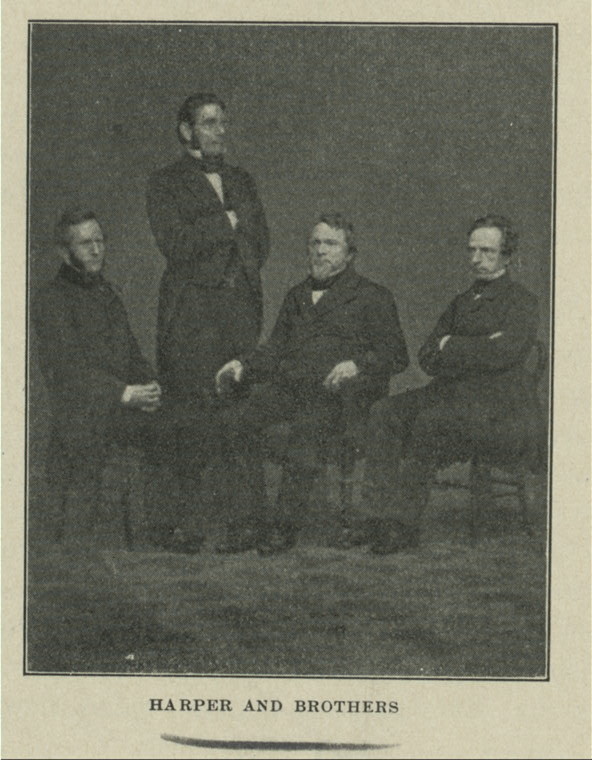Harper & Brothers
Columbia University's Rare Book and Manuscript Library holds many of the early Harper & Brothers Records. Their finding aid describes the company's history:
"J. & J. Harper was founded in 1817 by James and John Harper, using family funds. Brothers Wesley and Fletcher joined the family business in 1823 and 1825, respectively. Due to their early adoption of stereotyping technology, by 1825 they had become the largest volume publisher in New York City. In these early years, the majority of their titles were reprinted English books. Like other publishers of the time, Harper employees would wait on the docks to purchase books published in England, and republish them at a discount, a practice enabled by the cheaper materials available in America and the lack of international copyright law. During the depression of the 1830s, Harper & Brothers hit upon the idea of increasing sales by packaging many titles together in a series of great books. The Harper's Family Library was the first of these series, and a great success. Contemporary figures had strong attitudes regarding the series: John Quincy Adams praised it for helping to educate citizens in what they needed to know to participate in a democracy, but Henry Thoreau protested its attempt to shape American literary taste.
"In 1833 the firm's name was officially changed to Harper & Brothers. The social influence of the family grew, and in 1844, James Harper was elected major of New York. The firm continued to grow until in 1853 a devastating fire destroyed the Harper building and everything in it, excepting only the most important records which were kept in an iron vault. The saved documents include the ledgers and contracts which form the heart of this collection. Despite not having adequate insurance (publishing companies found it almost impossible to insure their property, due to the crowded conditions and flammable chemicals which their work entailed) Harper & Brothers decided to rebuild, and opened a new location on Franklin Square.
"Throughout the nineteenth century, Harper & Brothers was involved in attempts to set up a system of international copyright that would serve their interests. After the Civil War, the trade balance had changed, with paper products and costs of production now greater in the United States than in England, and Harper & Brothers used their political clout to prevent legislation that would have allowed the British to compete with American publishers.
"During the 1880s, Harper & Brothers grew to its maximum size and influence. At this time Harper & Brothers handled a volume of $4 million annually, with over 800 employees. They published the greatest authors of the generation, including Mark Twain, William Dean Howells, and sometimes Henry James. Harper also had significant breadth of influence, having a well-established London office that had been in operation since the 1830s, and had become a household name in the publication of nineteenth century textbooks.
"However, in the 1890s, drained by the death of several of the founders, the House began encountering financial problems. In the process of passing on family estates, many of the founders' holdings in the company were redeemed, leaving the company short on liquid assets. Harper & Brothers applied for, and received, a loan of $850,000 from J. P. Morgan in 1896. In 1899, Harper ceased making payments on the loan, essentially defaulting, and had to submit to reorganization.
"After a false start being run by competing publisher S. S. McClure, Harper asked Col. George M. Harvey to take over the receivership of the company. Harvey made several innovations, including giving William Dean Howells a more prominent role at the company by hiring him as a regular essayist and giving him a salary and an office at Harpers. Harvey was gifted at publicity, spending a great deal on entertaining the well-connected. However, he failed to make the needed cutbacks in the firm's operations, and resigned in failure in 1915. C. T. Brainard took his place. Brainard possessed the discipline necessary to enforce economies, but often imposed them short-sightedly. For example, his unwillingness to offer Sinclair Lewis a competitive royalty resulted in Harper's loss of that author. Two vice-presidents, T. B. Wells and Henry Hoyns, grew frustrated with Brainard's management, and took the initiative to present J. P. Morgan directly with an ambitious plan to pay off the firm's debts through the sale of equipment and real estate. Morgan agreed, and the firm moved to a new, smaller location on 33rd street and issued a run of preferred stock to raise the money to pay its debt. Harpers finally paid back J.P. Morgan in 1923. In 1924, Wells and Hoyns ousted Brainard and hired Douglas Parmentier. Cass Canfield, who would eventually rise to run the company, also joined the firm in this year.
"The move to 33rd Street revitalized the company, and all departments of Harpers publishing expanded their operations in the following years. Harpers went on to publish authors such as Thornton Wilder and John Cheever, as well as poets such as Ted Hughes and Sylvia Plath. In 1962 Harper & Brothers merged with Row, Peterson, and Company to become Harper and Row."
